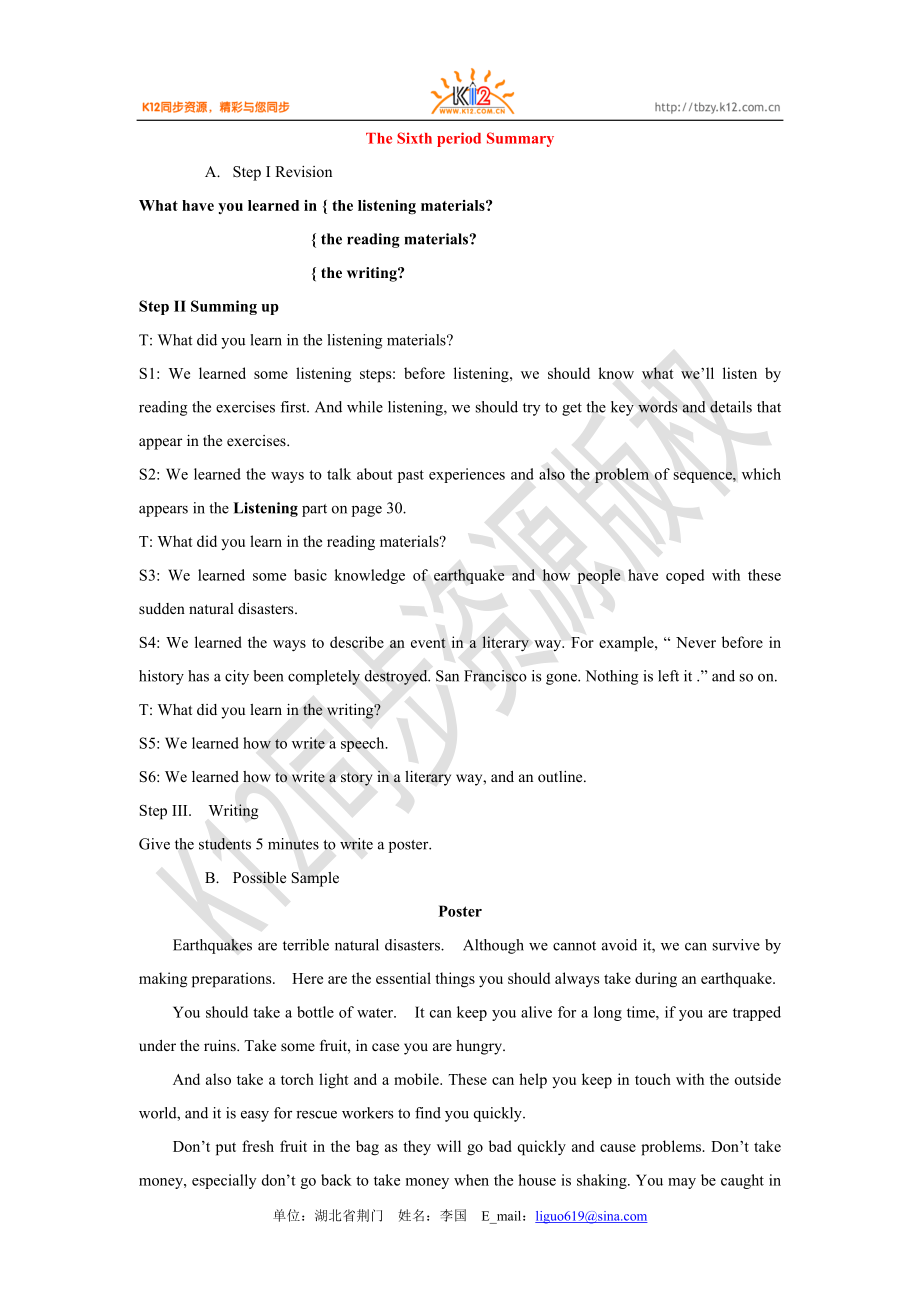《高一英語(上)必修一unit 4 The Sixth period Summary教案》由會(huì)員分享�����,可在線閱讀��,更多相關(guān)《高一英語(上)必修一unit 4 The Sixth period Summary教案(2頁珍藏版)》請(qǐng)?jiān)谘b配圖網(wǎng)上搜索�����。
1�、
The Sixth period Summary
A. Step I Revision
What have you learned in { the listening materials?
{ the reading materials?
{ the writing?
Step II Summing up
T: What did you learn in the listening materials?
S1: We learned some listening steps: before listening, we should know wh
2�����、at we’ll listen by reading the exercises first. And while listening, we should try to get the key words and details that appear in the exercises.
S2: We learned the ways to talk about past experiences and also the problem of sequence, which appears in the Listening part on page 30.
T: What did you
3�����、 learn in the reading materials?
S3: We learned some basic knowledge of earthquake and how people have coped with these sudden natural disasters.
S4: We learned the ways to describe an event in a literary way. For example, “ Never before in history has a city been completely destroyed. San Francis
4�����、co is gone. Nothing is left it .” and so on.
T: What did you learn in the writing?
S5: We learned how to write a speech.
S6: We learned how to write a story in a literary way, and an outline.
Step III. Writing
Give the students 5 minutes to write a poster.
B. Possible Sample
Poster
Earthqua
5�、kes are terrible natural disasters. Although we cannot avoid it, we can survive by making preparations. Here are the essential things you should always take during an earthquake.
You should take a bottle of water. It can keep you alive for a long time, if you are trapped under the ruins. Take so
6����、me fruit, in case you are hungry.
And also take a torch light and a mobile. These can help you keep in touch with the outside world, and it is easy for rescue workers to find you quickly.
Don’t put fresh fruit in the bag as they will go bad quickly and cause problems. Don’t take money, especially
7�����、don’t go back to take money when the house is shaking. You may be caught in the ruins.
C. Step IV Project
This project begins by asking students to review what they have learned about earthquakes and how people have coped with these sudden natural disasters. It then asks them to apply that knowle
8、dge by making a checklist of things that should be done before, during and after a quake hits. The functional item of the unit is reviewed as students are discussing and deciding the order of their checklists. It is not necessary or likely that students will number their checklists the same. What ma
9���、tters is whether the sequence is logical or not. Finally, the students must choose one action from the checklist to discuss in more detail.
Answers to the PROJECT
1. How to plan for future disaster;
2. How to make new buildings after;
3. How to teach children about earthquake safety;
4. How to
10、rescue those who still trapped in the ruins;
5. How to take care of the survivors
6. How to recognize shelters for survivors;
7. Where to put information for survivors and their families;
8. What to do with the ruins;
9. What to do with the buildings that survived the quake;
10. How to repair buildings that survived the quake;
11. Where to get money to build again;
12. Where to find people to help rebuild;
13. How to honor those killed in the quake;
14. How to honor the rescue workers.
Step V Homework
單位:湖北省荊門 姓名:李國(guó) E_mail:liguo619@
 高一英語(上)必修一unit 4 The Sixth period Summary教案
高一英語(上)必修一unit 4 The Sixth period Summary教案

